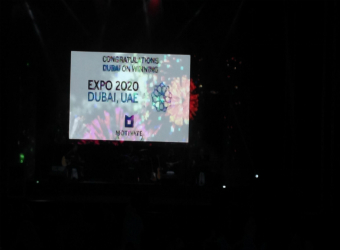The United Arab Emirates has won the right to host the 2020 World Expo in Dubai, sparking national jubilation as the business and tourism hub secured a fillip to its recovering economy.
Five years after its damaging economic crisis, Dubai on Wednesday became the first Middle Eastern country to host the expo, fending off competition from Ekaterinburg (Russia), Izmir (Turkey), and São Paulo (Brazil) in the international vote held in Paris.
Expos, dating back to the great exhibition of 1851 in London, are held every five years and allow nations to create their own pavilions to showcase national development in science and culture.
Dubai, which has been planning its bid since 2009, will build its expo complex near its new airport in the city’s desert outskirts, where the emirate is set to unveil a massive expansion potentially trebling the city’s passenger capacity by 2020.
After the announcement, a fireworks display lit up the world’s tallest tower, the Burj Khalifa in downtown Dubai.
“Expo 2020 will trigger higher levels of tourism, economic and investment activity in the UAE, further boosting the business environment,” said Khalid Howladar, Dubai-based senior credit officer at Moody’s, the rating agency.
Dubai’s damaging real estate crash in 2008 and sovereign debt crisis a year later ended in a $20bn-plus bailout backed by Abu Dhabi, the oil-rich UAE capital. The city is still burdened by an estimated $120bn debt and faces maturity repayments of about $85bn by 2017, according to the IMF.
But a revival of trade and tourism, bolstered by the emirate’s status as a haven in the turbulence of the Arab spring, has helped lift economic growth.
The expo could cement the city’s renaissance, and Dubai’s commercial sector anticipates it will give an estimated €28.8bn economic boost and create some 277,000 jobs.
The government has earmarked $7bn for exhibition infrastructure, and is publicising the event as beneficial not only to the business hub itself, but for the broader region it serves: from the Middle East and Africa to central and south Asia.
Official statistics show Dubai’s economy grew 4.9 per cent in the first half of 2013 – the highest level in six years – as the emirate enters into a new boom.
However, Dubai’s re-entry into the global spotlight could also focus critical attention on workers’ rights, legal issues and the crackdown on dissent and free speech since the Arab spring, as Qatar is finding with scrutiny of its treatment of manual labourers in the wake of its successful World Cup 2022 bid.
While some analysts argue that expectations of a successful expo bid contributed to the positive economic sentiment in recent months, surging optimism still risks fuelling another property bubble and exposing the economy to inflationary pressures.
“Current exuberance and expectation surrounding the event are such that it could trigger credit and asset price bubbles,” said Mr Howladar.
Real estate prices have risen by a third over the past six months as apartments in less popular areas are lifted by the city’s overall economic recovery, prompting the government to double property registration fees in a bid to calm the market.
CBRE, the real estate consultancy, says another two years of similar growth in sales and leasing rates would introduce a “serious affordability issue” that would have an impact on the emirate’s competitiveness.
“The government is aware of this,” says Nick Maclean, managing director of CBRE Middle East. “More regulation is needed, although clearly any new controls will need to be balanced, so as to maintain Dubai as an attractive location for inward investment.”
Source: The Financial Times


